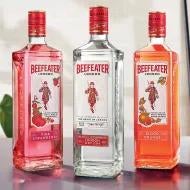Creating a More Convivial World, a World Without Excess
We are passionate hosts... a global family of exceptional people who are committed to fighting alcohol misuse and creating a better way to live and work together, to bring Good Times from a Good Place, today and for generations to come.
Reducing harmful drinking is core to our corporate premiumisation strategy. We want to ensure that our brands are enjoyed in moderation and responsibly and we encourage our employees and consumers to be responsible hosts and respectful guests.
We actively participate in the global public debate around alcohol and health. We respect our consumers and set high standards for marketing and self-regulation and operate with transparency about all our policies.
In the markets where we distribute our products, Pernod Ricard contributes to alcohol harm reduction through targeted interventions. In 2022, 93% of markets have contributed to a local or global responsible drinking initiative.
We are a founding member of the International Alliance for Responsible Drinking (IARD), established in 2015, as well as its predecessor organisations, ICAP and GAP-G. IARD is a not-for-profit organisation dedicated to reducing harmful drinking and promoting understanding of responsible drinking, acting as forum for the largest international beer, wine and spirits companies. In this forum, new rules on responsible marketing have been crafted, with Pernod Ricard playing its full part in the formulation of these rules and their strict implementation.
We play a leading role within industry trade associations and contribute to relevant conversations related to public policy, in a transparent and ethical way.
Pernod Ricard is committed to upholding these principles by continually engaging with our own workforce and working with relevant stakeholders such as government bodies, educators, and associations to address issues and improve our societies for everyone.
Code for Commercial Communications
Code of Business Conduct
Global Human Rights Policy

© Antoine Doyen
"Pernod Ricard’s ambition is to be a responsible and committed stakeholder in society. This ambition translates into an ambitious Sustainability & Responsibility strategy, as well as a contribution to civil society dialogue on matters that are relevant to the company.
Our public affairs teams around the world are tasked with this contribution: sharing our views, informing policy makers about our industry, suggesting positive solutions.
We seek to contribute thoughts and ideas, alongside all other stakeholders, to various discussions, such as: what is a fair and effective tax policy, how can responsible drinking be encouraged, how to regulate international trade or how to secure the highest levels of food safety etc. We are proud to contribute a view to this debate, in a transparent and responsible fashion."
Laurent Scheer, VP, Global Public Affairs & Alcohol in Society
Alcohol and health
Our “raison d’être” is to create moments of conviviality. We believe that, when consumed responsibly, our products can contribute to enjoyment and pleasure, and bring people together. Conviviality is by essence a question of individual and collective responsibility. On the other hand, there is no conviviality with excess drinking. Irresponsible drinking can result in serious health and social harm. It is our duty to educate people who make the choice to drink alcohol on the dangers of an excessive or inappropriate consumption of alcohol and on the principles of a responsible consumption.
We believe that, as an alcohol beverage producer, Pernod Ricard has a role to play in the reduction of irresponsible use of alcohol. We actively participate in the global public debate around responsible drinking through the International Alliance of Responsible Drinking (IARD), and we support WHO programmes on health and in particular the Global Action Plan for the Prevention and Control of Non-Communicable Diseases.
Drinking alcohol is not for everyone and may be inappropriate under some circumstances. Underage individuals, pregnant women and others advised not to drink by their health care practitioners should not drink alcohol. People who are driving should strictly comply with the blood alcohol content (BAC) limit set by local road safety laws and regulations, and ultimately we believe that the most responsible way to enjoy our products is to not consume them before driving.
We respect the right of every adult to choose whether to consume alcoholic beverages or not, and we encourage those who decide to drink to do so responsibly and to follow the official drinking guidelines and recommendations on alcohol consumption applicable in their local country.
We acknowledge that drinking alcohol may cause health problems in certain circumstances, in particular regular heavy drinking which has been associated with a number of illnesses, including certain types of cancer.
Excessive drinking, and in particular binge drinking, can cause injury, social issues, and can be harmful to health; as a consequence it has no place in the responsible enjoyment to our products.
To learn more about WHO data on trends in consumption, drinking patterns and harm in different regions of the world
To learn more about Pernod Ricard’s position on alcohol and health
To learn more about Pernod Ricard’s actions on responsible drinking

Marketing and self-regulation
Irresponsible consumption or inappropriate advertising of alcohol beverages may have negative personal, social or health consequences, or otherwise negative consequences for the industry. Pernod Ricard believes that strong and comprehensive self-regulation commitments are effective in meeting the ethical expectations of its consumers and stakeholders in the rapidly- changing world of today’s media while at the same time building brand equity. Acknowledging and going beyond the Advertising and Marketing Communications Code of the International Chamber of Commerce, Pernod Ricard - through its Code for Commercial Communications - ensures that its commercial communications not encourage or condone irresponsible consumption or misuse of any kind, as well as inappropriate advertising of our products. Pernod Ricard is also committed to being an industry leader in helping raise the standard on responsible marketing of alcoholic beverages, with a special focus on digital marketing and prevention of underage exposure to ads.
In our dialogues with policy makers, we do promote self-regulation or co-regulation, as local context allows, as we believe it is a quick and effective way of ensuring positive health outcomes. We do not believe that blanket bans on marketing achieve the stated ambition of reducing alcohol related harm. The drinking patterns that can be observed in several countries who have chosen to prohibit alcohol marketing show there is little empirical evidence of how such bans are effective from a public health standpoint.
Transparency and Integrity
Pernod Ricard believes in the appropriate regulation of the wine and spirits sector, and we go beyond compliance to play an active role in the communities we do business in. We believe our duty to society includes speaking up, and not being shy about our beliefs on public policy issues that are relevant to our business.
We employ in-house professionals of this engagement, called public affairs, working full time on public policy issues. A headquarters team is ensuring global coordination and liaising with international institutions (EU, OECD, WTO, WHO etc). Direct entities of the Group all have such functions as well, which are organised differently for each entity and geography.
Depending on the country, we may employ outside resources in the form of consultants, and usually join the relevant industry groupings that engage with government on public policy issues.
All of our lobbying is conducted openly, transparently and ethically and it’s consistent with our Sustainability and Responsibility commitments.
We obviously comply with all the laws and regulations of the countries where we operate, including those regarding lobbying practices, disclosure of lobbying expenses etc. Furthermore, we abide by the provisions of our Code of Business Conduct, which contains rules to avoid improper conduct with public officials specifically.
In a number of countries, we have signed up to local codes of conduct for public affairs professionals. In our headquarter country, France, we have signed up to a declaration with Transparency International, with a group of like-minded companies. We commit to the highest standards of ethical behaviour and transparency in our lobbying practices.
The long-standing publication of our main public policy positions on our corporate website is a direct consequence of our relationship with Transparency International.

International trade
Trade liberalisation fosters competition, supports economic prosperity and jobs, brings greater choice to consumers and reduces costs for business. Pernod Ricard monitors trade liberalisation opportunities offered by our exporting countries in emerging countries and supports the reduction and, where possible, elimination of import tariffs on distilled spirits, wines and key inputs (cereals, bulk ethyl, glass, labels, closures and packaging materials) as well as wider trade related domestic reforms that improve trading conditions. It is consumers who ultimately benefit from the market opening, by enjoying access to a greater number of quality brands at more affordable prices.
In addition, we speak against protectionism and support the elimination of non-tariff barriers to access for imported spirits including import quotas, discriminatory licensing requirements, anti-competitive practices of state trading enterprises, burdensome labelling and certification requirements and any other measures that are inconsistent with the terms of the World Trade Organization (WTO) rules-based framework.
Taxation
We are committed to contribute to the communities in which we work, including through contributions to local and national economies through taxation.
We stand for a fair, proportionate, non-discriminatory, predictable and sustainable taxation policies ensuring a level playing field and a fair competitive relationship between the alcoholic beverage sectors and economic operators across the value chain. Taxation of alcohol beverages should be part of a comprehensive fiscal and regulatory framework that is proportionate, appropriate for each local context, and consistent with international rules. It should neither create market distortions nor exacerbate issues of harmful consumption. It should take also into account the impact on jobs and growth across the supply chain including, farmers, producers, retail, hospitality, and tourism sectors that are core drivers of many economies across the world.
The balancing act in the field of taxation is to support tackling harmful use without penalising moderate drinkers, and optimise government revenues without hampering competition or driving illicit trade. Unbalanced excise duty policies do not optimise revenues, do not enable consumers to make informed choices and do not help to protect the most vulnerable population groups adequately from alcohol misuse; they penalise moderate consumers of our products and hamper fair competition across all drink choices and alcohol beverages producers.
- Tax instruments have shown limitations when it comes to effectively reducing harmful drinking: tax increases do not necessarily reduce consumption and, reducing overall consumption will not necessarily reduce alcohol-related harm
- High levels of taxation may penalise moderate drinkers and those with limited disposable income. Some scientific studies show the heaviest drinkers, including heavy episodic drinkers, are the least sensitive to pricing policies.
- Disproportionate levels of taxation may lead to other unintended consequences, including growth in the unrecorded and illegal markets, tax evasion and corruption, illicit trade, and a resulting loss, rather than an increase, in government revenue. Particularly in countries where a large share of the alcohol market is unrecorded, taxation of the regulated alcohol sector may not significantly reduce harmful drinking.
We do support better regulation, including on taxation, focused on consumers interest that helps to tackle harmful use of alcohol without penalising moderate drinkers or undermining jobs & growth. To be effective, such regulatory frameworks, which includes taxation, must be accompanied by interventions aimed specifically at harmful drinking.

Environmental Preservation
We do rely heavily on the responsible and sustainable management of the environment. 100% of raw materials for our wines & spirits are agricultural products sourced directly from nature such as grapes, grains, fruits, vegetables or botanicals. Sustainable sourcing, water efficiency and production processes are critical issues at the core of our business. It is in our DNA and at the heart of what we do.
Climate change is one of the most urgent challenges facing our generation. Combatting it and protecting the environment is a true priority and a major focus of Pernod Ricard’s environmental policy.
We are willing to play our part mobilising further engagement in the transition towards more sustainable food systems within our sphere of influence through tangible, relevant and measurable commitments in contribution to the common goals. In our ongoing journey towards climate-neutrality, we do work with all relevant actors, including farmers and partners involved in the transport, sales, and distribution of our goods.
We believe that this transformative journey towards more environmental sustainability must be supported by public policies allowing companies to lead the way through collaboration to deliver ambitious sustainable journey and commitments in line with SDGs. We strongly believe that by working closely with others we can learn by sharing knowledge, we can improve by challenging each other and we can innovate by trailing solutions together by adopting a multi- stakeholder approach.
We consider it is our duty to inform policy making by pointing out any areas of improvements in proposed policies, offering our practical expertise in how manufacture, distribution, marketing or sale of our products can be made as green as possible.





























